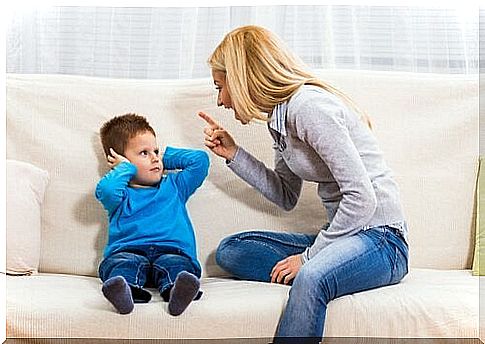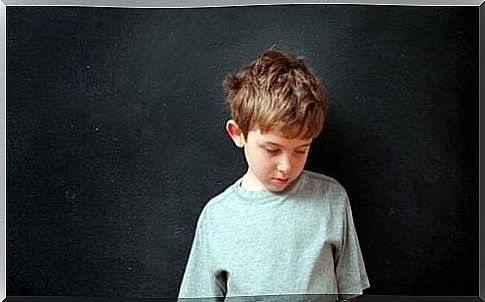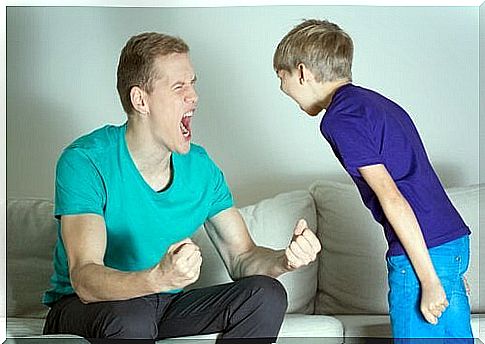What Are The Consequences If We Yell At Children?

Thinking about the consequences of yelling at our children can motivate us to control ourselves and reduce the impulse to treat our children in this way. Analyzing where our screams are coming from is key to getting rid of this behavior forever.
We all know the importance of raising our children in a place of respect. We have many resources and tools to do this that don’t rely on us yelling at them. Even so , at moments when we feel overwhelmed, we may feel the urge to yell at our children. After that, we mostly feel guilty, frustrated, and bad parents. Right?
Many parents do not even know the negative consequences of this behavior. In this article we talk about two of the most dangerous ones that can affect our children’s development into adulthood.
“Shouting the truth no longer makes it true.”
Alejandro Casona
Shouting at children can weaken their self-esteem
Shouting conveys a message of lack of patience and tolerance. When we are desperate about something, we tend to raise our voices and demand it by screaming. But yelling at our children sends the unmistakable message that they did something wrong. Although we try to make them obey us, they feel that they cannot meet our expectations.

If this happens all the time, we are giving the wrong idea. We lead people to believe that no matter what the children do, they can never get it right. We can also create the feeling that we are never satisfied and that nothing they do makes us happy. The feeling that they deserve all the shouting will very likely stay with them their entire lives.
The foundation of our children’s self-esteem is laid from the outside. With love and acceptance, as their role models, we have to give them the feeling that we can do anything. That doesn’t mean we should fill them with false trust. It is necessary that they also experience frustration. However, it is important that our expectations are adapted to their age and knowledge. And most importantly, we need to realize that our children are not perfect – like us.
“The man who has nothing to say screams.”
Enrique Jardiel Poncela
Communication with our children
For example, it is very common that we yell at our children in the morning when we are in a hurry to get them to school. Even so, we can’t expect kids to get their chores done as quickly as we would. Their “speed” depends on their age and their autonomy. Maybe they need help getting ready and being on time.
If we don’t give them enough time or ask them to do something beyond their abilities, it’s only normal that they can’t live up to the request. We use it to prepare the situation ourselves in which we scream and make them feel that they cannot do anything. The message they get in situations like this is that we wouldn’t love them because we think they are incapable.
We must not forget that it is our job to help them until they become independent. In this way we encourage real trust. In time, our children will begin to behave properly. They respect their parents, help around the house or clear out their rooms. But they won’t do it in a place of fear. Their actions are then based on an understanding of their role and the belief that they are able to do it themselves.
“When people talk to one another, the truth is not uttered by whoever shouts, but by whoever is able to formulate his arguments correctly.”
Fernando Savater
Screaming teaches children to misuse their emotions
We have to be role models for our children. If we keep screaming and losing our temper, it means we are losing calm in these situations. The message we are conveying is that we are unable to control ourselves. The little ones learn that screaming is a valid response to stress. They are adding this type of expression to their repertoire and are likely to repeat it in the future.
“What kind of life can it be that begins with the mother’s screams and the child’s crying?”
Baltasar Gracián

Therefore, it is our responsibility to learn to deal with our emotions. Despite our fear, tiredness or anger, we have to control ourselves in front of the little ones. Yelling at our children about stress only teaches them that anger is a good reason to abuse others.
It’s not their fault that we feel angry or scared every time they take a step. Even if we find it difficult, it’s important to encourage them to explore and discover who they really are. It is our job to accompany them on their adventures. We also need to find out where our negative emotions come from.
Maybe they need to behave the way we want them to behave and not for who they really are. We may be afraid that they will suffer or harm themselves. However , yelling at children to protect them or guide their actions is usually not a good idea. Making sure that things will go well for them since they are able to take care of themselves is the better alternative.
“It amazes me how she expresses herself through screaming and her instability from noise, so I began to suspect that she is either really pleased or afraid of the silence.”
César González Ruano
Conclusion
In this article, we talked about the most negative effects of yelling at our children. Given how harmful this behavior can be, both parents need to learn to control their emotions. Parents should also practice solving problems and dealing with conflicts more effectively.
If you’ve ever yelled at your kids, don’t punish yourself for it. Nobody is perfect. It is important that you get rid of this behavior now that you know the serious consequences.









